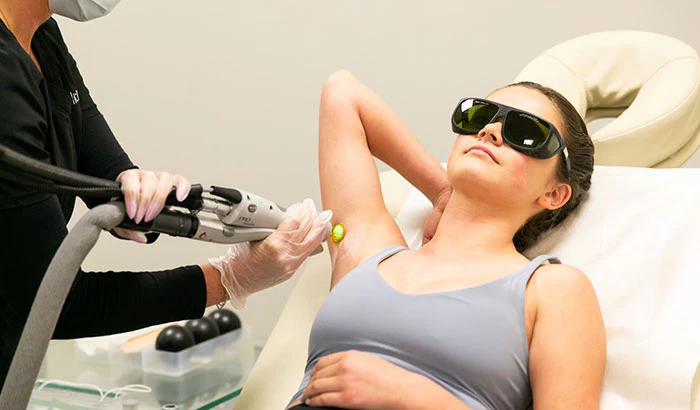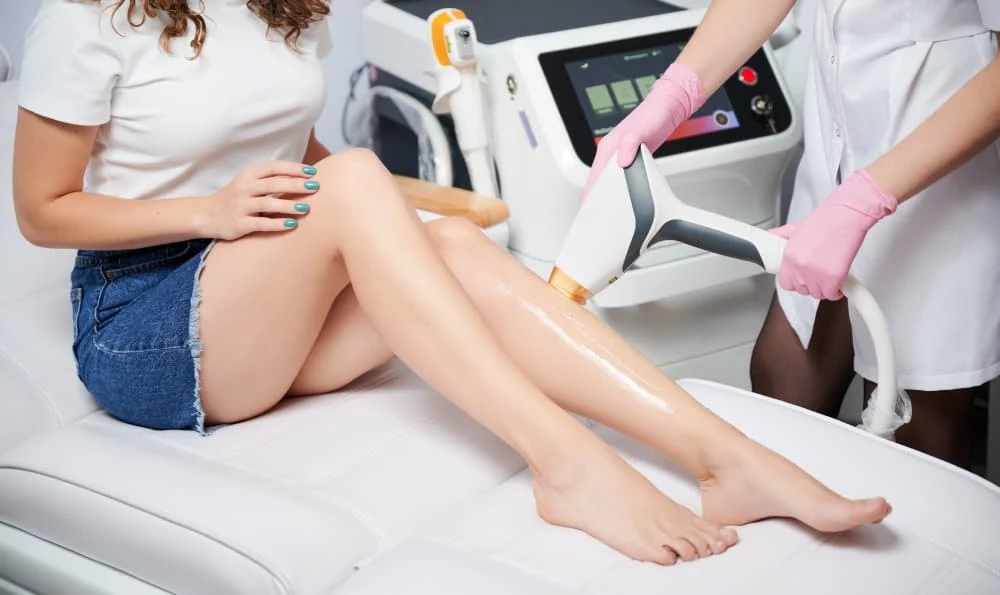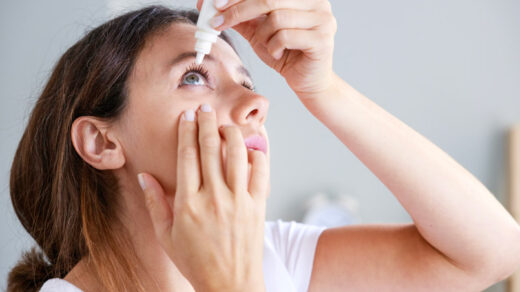In the field of contemporary medical aesthetics, laser hair removal has become the most popular permanent hair removal method with a hair removal rate of over 90%. According to statistics, the global laser hair removal market is expected to exceed US$2.4 billion by 2025, with an annual growth rate of 18% in China. This article will comprehensively analyze the principles, target audience, treatment design, and post-treatment care of laser hair removal to help you make an informed choice.

I. The Scientific Principles of Laser Hair Removal
1. Selective photothermal effect
- Melanin absorbs specific wavelengths of light energy (commonly 755nm/808nm/1064nm).
- Light energy converts to heat, damaging hair follicle stem cells.
- Hair enters a dormant phase (based on hair growth cycle theory).
2. Comparison with Traditional Methods
| Method | Duration of Results | Pain Level | Suitable Areas | Cost Comparison |
|---|---|---|---|---|
| Razor | 1–3 days | None | Full body | ¥ |
| Waxing | 3–4 weeks | ★★★☆ | Limbs/bikini line | ¥¥ |
| At-home hair removers | 1–2 years | ★☆ | Small areas | ¥¥¥ |
| Professional laser | 5–7 years* | ★★☆ | Full body | ¥¥¥¥ |
*Note: 80% of users experience over 70% hair reduction within 7 years (FDA clinical data).
II. Comparison of 5 Mainstream Laser Devices
| Technology Type | Best Skin Type | Pain Index | Treatment Sessions | Representative Devices |
|---|---|---|---|---|
| Alexandrite 755nm | Fair/light skin | ★★☆ | 6–8 | Candela GentleLase |
| Diode 808nm | All skin types* | ★★☆ | 8–10 | Soprano Ice |
| Long-pulse 1064nm | Dark skin | ★☆ | 10–12 | Cutera Excel HR |
| Intense Pulsed Light (IPL) | Non-dark skin | ★★★ | 10+ | Philips Lumea |
| Vacuum-assisted laser | Sensitive areas | ★☆ | 5–7 | Cynosure Elite+ |
*Asian yellow skin requires a dynamic cooling system.
III. Standardized Treatment Process
1. Pre-Treatment Preparation (Critical!)
- 4 weeks prior: Stop waxing/tweezing (shaving only).
- 1 week prior: Avoid sun exposure (use SPF30+ protection).
- 24 hours prior: Shave treatment area (leave 1mm stubble).
2. Single Treatment Process
- Skin assessment (Wood’s lamp to evaluate melanin distribution).
- Apply cooling gel (reduces risk of epidermal damage).
- Laser irradiation (15–45 minutes per area).
- Ice compression (relieves erythema reaction).
3. Treatment Plan
| Area | Interval Cycle | Single Session Effect | Total Sessions |
|---|---|---|---|
| Facial (upper lip) | 4 weeks | 15–20% reduction | 8–10 |
| Underarms | 6 weeks | 25–30% reduction | 6–8 |
| Bikini line | 8 weeks | 20–25% reduction | 8–10 |
| Legs | 8 weeks | 30–35% reduction | 5–7 |
IV. Safety Guidelines to Avoid Pitfalls
1. Absolute Contraindications
- Active vitiligo/psoriasis.
- Pregnancy and lactation.
- Photosensitive diseases (e.g., lupus erythematosus).
2. Illegal Practices to Watch For
- False “ice-painless” claims (all lasers cause some discomfort).
- Non-physician operation (China requires a Physician Qualification Certificate).
- Low-price traps (regular clinics charge ≥¥800 per underarm session).
3. Managing Adverse Reactions
| Symptom | Countermeasures | Recovery Period |
|---|---|---|
| Hyperpigmentation | Hydroquinone cream + strict sun protection | 3–6 months |
| Blisters | Sterile puncture + burn ointment | 2–3 weeks |
| Folliculitis | Mupirocin ointment | 1 week |
V. Post-Treatment Care Golden Rules
0–24 Hours
- Avoid hot water (use ≤37℃ warm water only).
- Pause all skincare products (including alcohol/acid-containing formulas).
1–7 Days
- Apply medical repair cream daily (containing centella asiatica).
- Wear loose cotton clothing to reduce friction.
Long-Term Maintenance
- Monthly touch-ups with at-home devices (recommended: BRAUN Silk-expert).
- Annual professional maintenance (targeting new fine hairs).
VI. Emerging Technology Trends
- AI-Powered Hair Removal: Optical skin detection automatically adjusts energy (e.g., Tria Beauty 4X).
- Permanent Removal Breakthroughs: Nanotechnology targeting hair follicle stem cells (in clinical trials).
- Non-Invasive Follicle Labeling: Special fluorescent agents enhance laser absorption.

Conclusion
Laser hair removal is a technology-dependent aesthetic procedure, with significant results varying by device. It’s a relatively fast process. When done by a trusted technician, it can guarantee long-term results with minimum side effects. It works best on those with contrasting skin and hair colors, for example, light skin and dark hair. It’s important to keep treated areas out of the sun and away from indoor tanning equipment.
Related articles:Skincare Myths: What to Avoid Now


